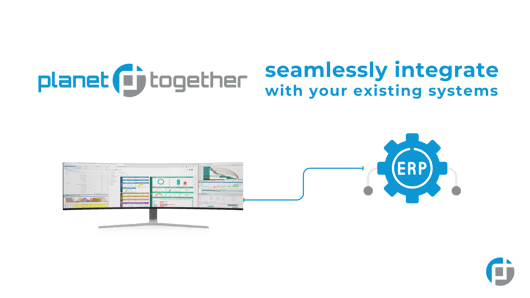In medical manufacturing, Purchasing Managers are no longer solely responsible for negotiating contracts or maintaining supplier relationships. They are now strategic contributors who must leverage real-time data, predictive analytics, and advanced planning systems to ensure resilient, cost-effective, and quality-focused supply chains.
This transformation is especially crucial in medical manufacturing, where product lifecycles are short, compliance is non-negotiable, and delays can affect patient health outcomes. The integration of data analytics platforms like PlanetTogether with enterprise systems such as SAP, Oracle, Microsoft Dynamics, Kinaxis, or Aveva is redefining procurement processes—turning them into data-driven engines of performance and reliability.
The Business Case for Analytics in Medical Procurement
Medical manufacturers operate in a highly regulated industry, and the pressure to balance quality, cost, and time-to-market continues to grow. In this context, Purchasing Managers are increasingly leveraging data analytics to:
Predict demand spikes due to outbreaks or market shifts.
Optimize supplier performance using data from previous purchase orders, lead times, and quality audits.
Reduce procurement costs through smarter forecasting and batch consolidation.
Mitigate risks by identifying fragile suppliers or logistics bottlenecks early.
By integrating an Advanced Planning and Scheduling (APS) system like PlanetTogether with core ERP or SCM platforms, purchasing teams can access comprehensive dashboards and automated workflows that bring clarity, speed, and control to procurement activities.

Real-Time Visibility with PlanetTogether and ERP Integration
One of the most powerful advantages of integrating PlanetTogether with systems like SAP or Oracle is the real-time visibility into procurement needs and inventory health.
For example:
PlanetTogether + SAP: When integrated with SAP’s Material Management (MM) and Production Planning (PP) modules, PlanetTogether can provide Purchasing Managers with precise forecasts on material usage, reorder levels, and supplier delivery performance—allowing for proactive decision-making.
PlanetTogether + Oracle SCM: With Oracle’s supply chain modules, PlanetTogether facilitates what-if analysis, helping procurement teams visualize the impact of alternate sourcing strategies under different demand scenarios.
This synchronization eliminates manual data consolidation and reduces lag time between planning and procurement, ensuring critical medical components are ordered before shortages occur.
Predictive Purchasing: Using AI and Advanced Analytics
In medical manufacturing, a delay in acquiring key materials—such as sterile components, specialty polymers, or pharmaceutical-grade chemicals—can derail production. Predictive analytics gives purchasing managers a proactive edge by:
Anticipating demand fluctuations based on seasonality, historical usage, and patient trends.
Identifying potential supply disruptions using external data like geopolitical events or shipping trends.
Suggesting optimal ordering windows based on supplier lead times and inventory turnover data.
When PlanetTogether is integrated with Microsoft Dynamics 365, for instance, machine learning models can be embedded into forecasting and scheduling modules. These models recommend dynamic purchase orders that are automatically aligned with production schedules—driving responsiveness and efficiency.
Enhancing Supplier Performance through Integrated Metrics
Supplier relationship management is core to procurement success. Yet, many medical manufacturers lack a holistic view of supplier performance across quality, cost, and reliability.
With analytics-powered dashboards from PlanetTogether integrated into systems like Kinaxis RapidResponse, Purchasing Managers can:
Track supplier KPIs in real time—such as on-time delivery rates, defect frequencies, and responsiveness.
Simulate sourcing changes to evaluate the impact of switching suppliers on overall manufacturing timelines.
Automate alerts when a supplier consistently underperforms, triggering reviews or reallocation of purchase volumes.
This level of insight empowers strategic sourcing decisions and builds more resilient supplier ecosystems that can adapt to demand volatility and regulatory changes.
Compliance and Traceability: Non-Negotiable in Medical Manufacturing
Traceability is paramount in medical manufacturing. Any material that goes into a medical product must be traceable back to its source, and analytics plays a vital role in ensuring compliance.
PlanetTogether’s integration with platforms like Aveva—commonly used for digital twin and manufacturing operations management—enables end-to-end traceability from procurement through production. Purchasing Managers benefit by:
Documenting supplier certifications and audits automatically within the purchasing workflow.
Tagging materials with digital identifiers to trace them through the APS and ERP systems.
Responding to recalls or compliance inquiries with rapid, data-backed traceability reports.
By embedding compliance into the analytics architecture, procurement teams ensure regulatory readiness at all times.
Cost Optimization through Scenario Modeling
Medical manufacturing often faces price volatility in raw materials and logistics. Data analytics enables scenario modeling to assess trade-offs and drive cost optimization.
Using PlanetTogether’s scenario planning capabilities, combined with tools in Oracle or SAP Integrated Business Planning (IBP), Purchasing Managers can:
Model the cost implications of early purchasing versus just-in-time strategies.
Run simulations comparing local vs. offshore suppliers based on changing tariffs or fuel costs.
Balance batch size economics against warehousing costs.
These models help procurement leaders make cost-optimized decisions that support production performance without inflating overheads.
Transforming Purchasing Teams into Strategic Enablers
The shift toward data-driven purchasing is not just about tools—it’s a mindset change. By embracing analytics and integrated planning systems, Purchasing Managers evolve from transactional order handlers into strategic enablers of operational excellence.
Key success factors for this transformation include:
Investing in upskilling procurement staff to understand and interpret analytics.
Breaking down data silos between purchasing, planning, production, and compliance teams.
Standardizing supplier performance metrics across platforms and departments.
Driving continuous improvement by benchmarking performance using historical data.
A Strategic Imperative
As medical manufacturing becomes increasingly complex and performance-sensitive, data analytics is no longer optional—it’s a strategic imperative. Purchasing Managers who embrace analytics and invest in integrated platforms like PlanetTogether, SAP, Oracle, Microsoft Dynamics, Kinaxis, or Aveva will be better equipped to:
Anticipate disruptions
Optimize supplier portfolios
Support continuous manufacturing
Drive cost savings while maintaining regulatory compliance
Ultimately, it’s about moving from reactive procurement to resilient, predictive, and performance-driven purchasing—one decision, one dataset at a time.
Are you ready to take your manufacturing operations to the next level? Contact us today to learn more about how PlanetTogether can help you achieve your goals and drive success in your industry.